- 下载源码,源码地址:https://github.com/cwalter-at/freemodbus
- 将所需文件放在同一文件夹中
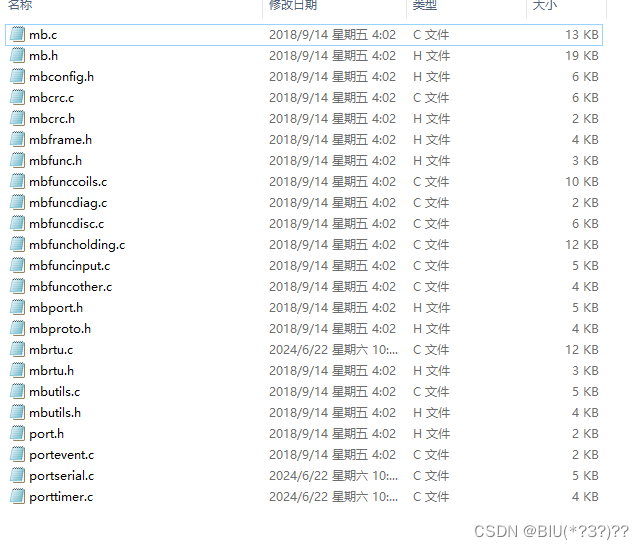
- 新建HAL库项目:
- 定时器周期设为50us;使能中断
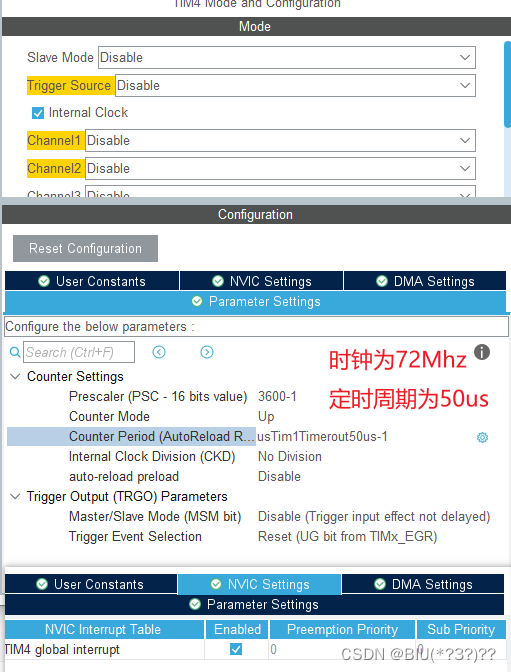
- 设置串口;开启串口中断
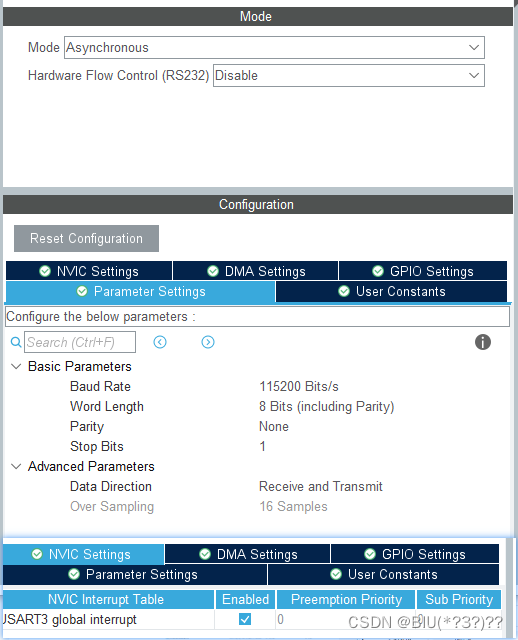
- 设置中断优先级,Modbus优先级设置最高防止时序被破坏;不生成中断处理函数,自己编写
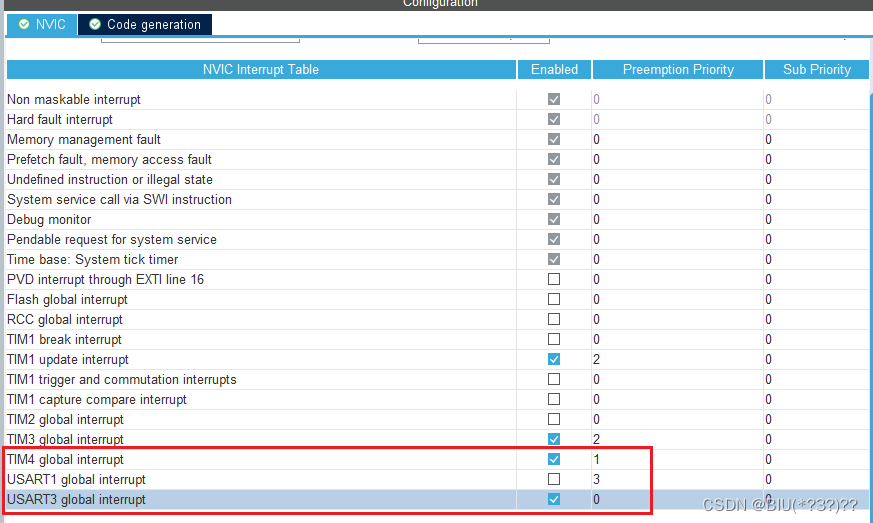
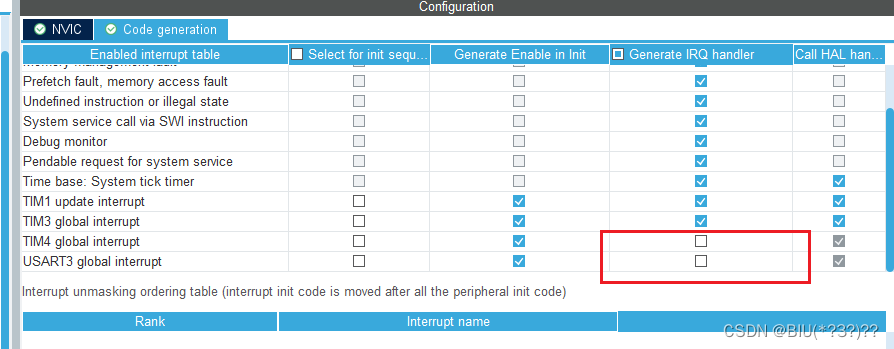
- 添加Modbus文件
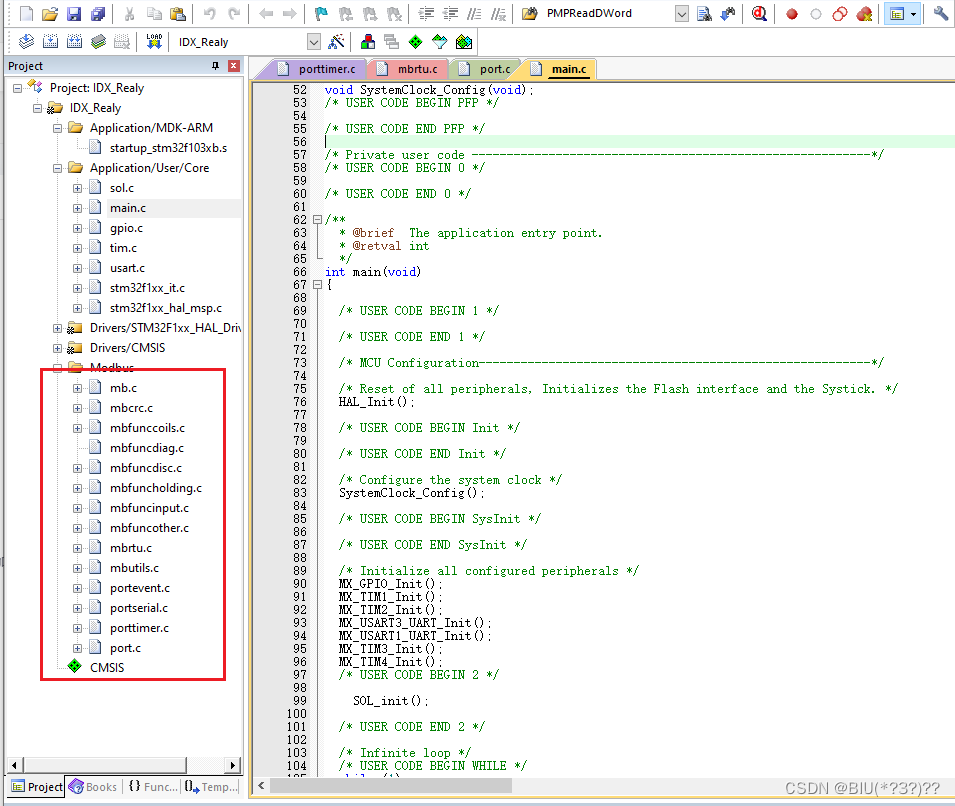
- 修改portSerial.c文件:
/*
* FreeModbus Libary: BARE Port
* Copyright (C) 2006 Christian Walter <wolti@sil.at>
*
* This library is free software; you can redistribute it and/or
* modify it under the terms of the GNU Lesser General Public
* License as published by the Free Software Foundation; either
* version 2.1 of the License, or (at your option) any later version.
*
* This library is distributed in the hope that it will be useful,
* but WITHOUT ANY WARRANTY; without even the implied warranty of
* MERCHANTABILITY or FITNESS FOR A PARTICULAR PURPOSE. See the GNU
* Lesser General Public License for more details.
*
* You should have received a copy of the GNU Lesser General Public
* License along with this library; if not, write to the Free Software
* Foundation, Inc., 51 Franklin St, Fifth Floor, Boston, MA 02110-1301 USA
*
* File: $Id$
*/
#include "port.h"
#include "usart.h"
/* ----------------------- Modbus includes ----------------------------------*/
#include "mb.h"
#include "mbport.h"
/* ----------------------- static functions ---------------------------------*/
static void prvvUARTTxReadyISR( void );
static void prvvUARTRxISR( void );
/* ----------------------- Start implementation -----------------------------*/
void
vMBPortSerialEnable( BOOL xRxEnable, BOOL xTxEnable )
{
/* If xRXEnable enable serial receive interrupts. If xTxENable enable
* transmitter empty interrupts.
*/
//STM32串口接收中断使能
if(xRxEnable == TRUE)
{
//UART中断使能
__HAL_UART_ENABLE_IT(&huart3,UART_IT_RXNE );
}
else
{
//禁止接收和接收中断
__HAL_UART_DISABLE_IT(&huart3,UART_IT_RXNE );
}
//STM32串口发送中断使能
if(xTxEnable == TRUE)
{
//使能发送中断
__HAL_UART_ENABLE_IT(&huart3, UART_IT_TC);
}
else
{
//禁止发送中断
__HAL_UART_DISABLE_IT(&huart3, UART_IT_TC);
}
}
BOOL
xMBPortSerialInit( UCHAR ucPORT, ULONG ulBaudRate, UCHAR ucDataBits, eMBParity eParity )
{
huart3.Instance = USART3;
huart3.Init.BaudRate = ulBaudRate;
huart3.Init.StopBits = UART_STOPBITS_1;
huart3.Init.Parity = UART_PARITY_NONE;
huart3.Init.Mode = UART_MODE_TX_RX;
huart3.Init.HwFlowCtl = UART_HWCONTROL_NONE;
huart3.Init.OverSampling = UART_OVERSAMPLING_16;
switch(eParity)
{
// 奇校验
case MB_PAR_ODD:
huart3.Init.Parity = UART_PARITY_ODD;
huart3.Init.WordLength = UART_WORDLENGTH_9B; // 带奇偶校验数据位为9bits
break;
// 偶校验
case MB_PAR_EVEN:
huart3.Init.Parity = UART_PARITY_EVEN;
huart3.Init.WordLength = UART_WORDLENGTH_9B; // 带奇偶校验数据位为9bits
break;
// 无校验
default:
huart3.Init.Parity = UART_PARITY_NONE;
huart3.Init.WordLength = UART_WORDLENGTH_8B; // 无奇偶校验数据位为8bits
break;
}
HAL_UART_Init(&huart3);
return TRUE;
}
BOOL
xMBPortSerialPutByte( CHAR ucByte )
{
/* Put a byte in the UARTs transmit buffer. This function is called
* by the protocol stack if pxMBFrameCBTransmitterEmpty( ) has been
* called. */
USART3->DR = ucByte;
return TRUE;
}
BOOL
xMBPortSerialGetByte( CHAR * pucByte )
{
/* Return the byte in the UARTs receive buffer. This function is called
* by the protocol stack after pxMBFrameCBByteReceived( ) has been called.
*/
*pucByte = (USART3->DR & (uint16_t)0x00ff);
return TRUE;
}
/* Create an interrupt handler for the transmit buffer empty interrupt
* (or an equivalent) for your target processor. This function should then
* call pxMBFrameCBTransmitterEmpty( ) which tells the protocol stack that
* a new character can be sent. The protocol stack will then call
* xMBPortSerialPutByte( ) to send the character.
*/
static void prvvUARTTxReadyISR( void )
{
pxMBFrameCBTransmitterEmpty( );
}
/* Create an interrupt handler for the receive interrupt for your target
* processor. This function should then call pxMBFrameCBByteReceived( ). The
* protocol stack will then call xMBPortSerialGetByte( ) to retrieve the
* character.
*/
static void prvvUARTRxISR( void )
{
pxMBFrameCBByteReceived( );
}
void USART3_IRQHandler(void)
{
if(__HAL_UART_GET_FLAG( &huart3, UART_FLAG_RXNE ) != RESET)
{
prvvUARTRxISR();
__HAL_TIM_CLEAR_FLAG(&huart3,UART_FLAG_RXNE);
}
if(__HAL_UART_GET_FLAG( &huart3, UART_FLAG_TC ) != RESET)
{
prvvUARTTxReadyISR();
__HAL_TIM_CLEAR_FLAG(&huart3,UART_FLAG_TC);
}
}
修改porttimer.c文件
/*
* FreeModbus Libary: BARE Port
* Copyright (C) 2006 Christian Walter <wolti@sil.at>
*
* This library is free software; you can redistribute it and/or
* modify it under the terms of the GNU Lesser General Public
* License as published by the Free Software Foundation; either
* version 2.1 of the License, or (at your option) any later version.
*
* This library is distributed in the hope that it will be useful,
* but WITHOUT ANY WARRANTY; without even the implied warranty of
* MERCHANTABILITY or FITNESS FOR A PARTICULAR PURPOSE. See the GNU
* Lesser General Public License for more details.
*
* You should have received a copy of the GNU Lesser General Public
* License along with this library; if not, write to the Free Software
* Foundation, Inc., 51 Franklin St, Fifth Floor, Boston, MA 02110-1301 USA
*
* File: $Id$
*/
/* ----------------------- Platform includes --------------------------------*/
#include "port.h"
/* ----------------------- Modbus includes ----------------------------------*/
#include "mb.h"
#include "mbport.h"
#include "tim.h"
/* ----------------------- static functions ---------------------------------*/
static void prvvTIMERExpiredISR( void );
/* ----------------------- Start implementation -----------------------------*/
BOOL
xMBPortTimersInit( USHORT usTim1Timerout50us )
{
TIM_ClockConfigTypeDef sClockSourceConfig = {0};
TIM_MasterConfigTypeDef sMasterConfig = {0};
htim4.Instance = TIM4;
htim4.Init.Prescaler = 3600-1;
htim4.Init.CounterMode = TIM_COUNTERMODE_UP;
htim4.Init.Period = usTim1Timerout50us-1;
htim4.Init.ClockDivision = TIM_CLOCKDIVISION_DIV1;
htim4.Init.AutoReloadPreload = TIM_AUTORELOAD_PRELOAD_DISABLE;
if (HAL_TIM_Base_Init(&htim4) != HAL_OK)
{
Error_Handler();
}
sClockSourceConfig.ClockSource = TIM_CLOCKSOURCE_INTERNAL;
if (HAL_TIM_ConfigClockSource(&htim4, &sClockSourceConfig) != HAL_OK)
{
Error_Handler();
}
sMasterConfig.MasterOutputTrigger = TIM_TRGO_RESET;
sMasterConfig.MasterSlaveMode = TIM_MASTERSLAVEMODE_DISABLE;
if (HAL_TIMEx_MasterConfigSynchronization(&htim4, &sMasterConfig) != HAL_OK)
{
Error_Handler();
}
__HAL_TIM_CLEAR_FLAG(&htim4, TIM_FLAG_UPDATE); // 先清除一下定时器的中断标记,防止使能中断后直接触发中断
__HAL_TIM_ENABLE_IT(&htim4, TIM_IT_UPDATE); // 使能定时器更新中断
return TRUE;
}
inline void
vMBPortTimersEnable( )
{
/* Enable the timer with the timeout passed to xMBPortTimersInit( ) */
__HAL_TIM_SET_COUNTER(&htim4, 0); // 清空计数器
HAL_TIM_Base_Start_IT(&htim4);
}
inline void
vMBPortTimersDisable( )
{
/* Disable any pending timers. */
HAL_TIM_Base_Stop_IT(&htim4);
}
/* Create an ISR which is called whenever the timer has expired. This function
* must then call pxMBPortCBTimerExpired( ) to notify the protocol stack that
* the timer has expired.
*/
static void prvvTIMERExpiredISR( void )
{
( void )pxMBPortCBTimerExpired( );
}
/// 定时器4中断服务程序
void TIM4_IRQHandler(void)
{
if(__HAL_TIM_GET_FLAG(&htim4, TIM_FLAG_UPDATE)) // 更新中断标记被置位
{
__HAL_TIM_CLEAR_FLAG(&htim4, TIM_FLAG_UPDATE); // 清除中断标记
prvvTIMERExpiredISR(); // 通知modbus3.5个字符等待时间到
}
}
新建一个port.c文件,添加代码
#include "mb.h"
#include "mbport.h"
// 十路输入寄存器
#define REG_INPUT_SIZE 10
uint16_t REG_INPUT_BUF[REG_INPUT_SIZE];
// 十路保持寄存器
#define REG_HOLD_SIZE 10
uint16_t REG_HOLD_BUF[REG_HOLD_SIZE];
// 十路线圈
#define REG_COILS_SIZE 10
uint8_t REG_COILS_BUF[REG_COILS_SIZE] = {1, 1, 1, 1, 0, 0, 0, 0, 1, 1};
// 十路离散量
#define REG_DISC_SIZE 10
uint8_t REG_DISC_BUF[REG_DISC_SIZE] = {1,1,1,1,0,0,0,0,1,1};
/// CMD4命令处理回调函数
eMBErrorCode eMBRegInputCB( UCHAR * pucRegBuffer, USHORT usAddress, USHORT usNRegs )
{
USHORT usRegIndex = usAddress - 1;
// 非法检测
if((usRegIndex + usNRegs) > REG_INPUT_SIZE)
{
return MB_ENOREG;
}
// 循环读取
while( usNRegs > 0 )
{
*pucRegBuffer++ = ( unsigned char )( REG_INPUT_BUF[usRegIndex] >> 8 );
*pucRegBuffer++ = ( unsigned char )( REG_INPUT_BUF[usRegIndex] & 0xFF );
usRegIndex++;
usNRegs--;
}
// 模拟输入寄存器被改变
// for(usRegIndex = 0; usRegIndex < REG_INPUT_SIZE; usRegIndex++)
// {
// REG_INPUT_BUF[usRegIndex]++;
// }
return MB_ENOERR;
}
/// CMD6、3、16命令处理回调函数
eMBErrorCode eMBRegHoldingCB( UCHAR * pucRegBuffer, USHORT usAddress, USHORT usNRegs, eMBRegisterMode eMode )
{
USHORT usRegIndex = usAddress - 1;
// 非法检测
if((usRegIndex + usNRegs) > REG_HOLD_SIZE)
{
return MB_ENOREG;
}
// 写寄存器
if(eMode == MB_REG_WRITE)
{
while( usNRegs > 0 )
{
REG_HOLD_BUF[usRegIndex] = (pucRegBuffer[0] << 8) | pucRegBuffer[1];
pucRegBuffer += 2;
usRegIndex++;
usNRegs--;
}
}
// 读寄存器
else
{
while( usNRegs > 0 )
{
*pucRegBuffer++ = ( unsigned char )( REG_HOLD_BUF[usRegIndex] >> 8 );
*pucRegBuffer++ = ( unsigned char )( REG_HOLD_BUF[usRegIndex] & 0xFF );
usRegIndex++;
usNRegs--;
}
}
return MB_ENOERR;
}
/// CMD1、5、15命令处理回调函数
eMBErrorCode eMBRegCoilsCB( UCHAR * pucRegBuffer, USHORT usAddress, USHORT usNCoils, eMBRegisterMode eMode )
{
USHORT usRegIndex = usAddress - 1;
UCHAR ucBits = 0;
UCHAR ucState = 0;
UCHAR ucLoops = 0;
// 非法检测
if((usRegIndex + usNCoils) > REG_COILS_SIZE)
{
return MB_ENOREG;
}
if(eMode == MB_REG_WRITE)
{
ucLoops = (usNCoils - 1) / 8 + 1;
while(ucLoops != 0)
{
ucState = *pucRegBuffer++;
ucBits = 0;
while(usNCoils != 0 && ucBits < 8)
{
REG_COILS_BUF[usRegIndex++] = (ucState >> ucBits) & 0X01;
usNCoils--;
ucBits++;
}
ucLoops--;
}
}
else
{
ucLoops = (usNCoils - 1) / 8 + 1;
while(ucLoops != 0)
{
ucState = 0;
ucBits = 0;
while(usNCoils != 0 && ucBits < 8)
{
if(REG_COILS_BUF[usRegIndex])
{
ucState |= (1 << ucBits);
}
usNCoils--;
usRegIndex++;
ucBits++;
}
*pucRegBuffer++ = ucState;
ucLoops--;
}
}
return MB_ENOERR;
}
/// CMD2命令处理回调函数
eMBErrorCode eMBRegDiscreteCB( UCHAR * pucRegBuffer, USHORT usAddress, USHORT usNDiscrete )
{
USHORT usRegIndex = usAddress - 1;
UCHAR ucBits = 0;
UCHAR ucState = 0;
UCHAR ucLoops = 0;
// 非法检测
if((usRegIndex + usNDiscrete) > REG_DISC_SIZE)
{
return MB_ENOREG;
}
ucLoops = (usNDiscrete - 1) / 8 + 1;
while(ucLoops != 0)
{
ucState = 0;
ucBits = 0;
while(usNDiscrete != 0 && ucBits < 8)
{
if(REG_DISC_BUF[usRegIndex])
{
ucState |= (1 << ucBits);
}
usNDiscrete--;
usRegIndex++;
ucBits++;
}
*pucRegBuffer++ = ucState;
ucLoops--;
}
// 模拟离散量输入被改变
// for(usRegIndex = 0; usRegIndex < REG_DISC_SIZE; usRegIndex++)
// {
// REG_DISC_BUF[usRegIndex] = !REG_DISC_BUF[usRegIndex];
// }
return MB_ENOERR;
}
- 修改mbconfig.h,不需要ACSII模式
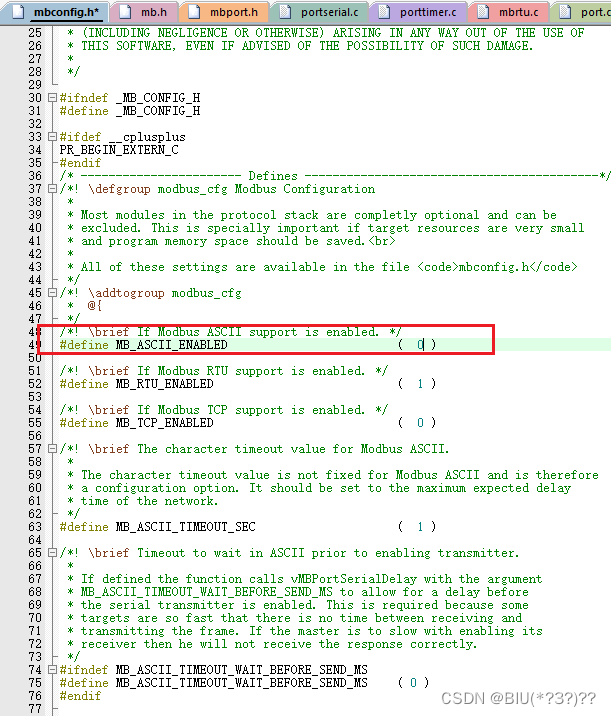
- 修改mbrtu.c文件;否则在hal库通讯有问题
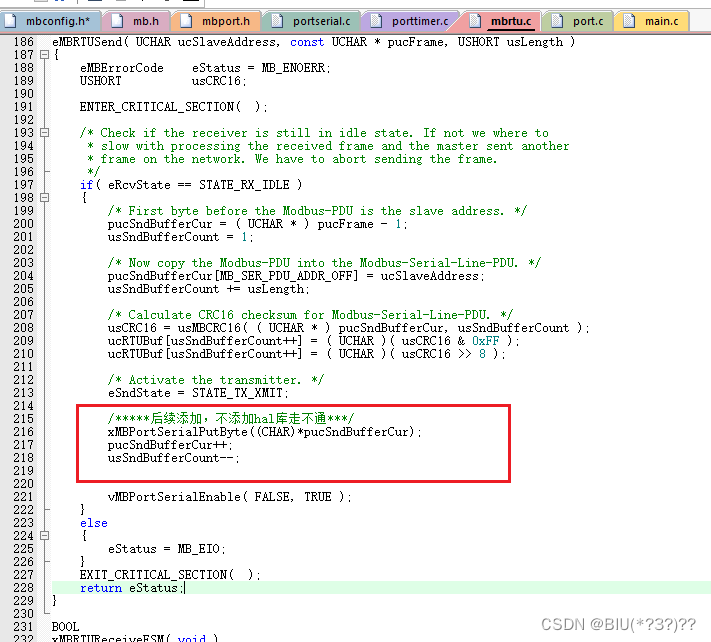
- 解决编译错误:

- main函数添加以下代码:
eMBInit(MB_RTU, 0x01, 0, 115200, MB_PAR_NONE);
eMBEnable();
for(;;)
{
eMBPoll();
}





















 2383
2383

 被折叠的 条评论
为什么被折叠?
被折叠的 条评论
为什么被折叠?








